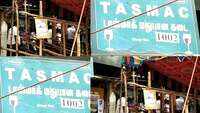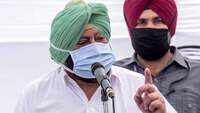
A government committee, which was constituted by the National Green Tribunal (NGT) to study pollution in the Bhavani river, has identified a slew of environmental norm violations by public entities.
The government hospital at Mettupalayam, local municipality and some industries have been found releasing untreated waste into the river.
The issue was first highlighted by TOI in its report dated January 20, 2017. NGT, southern zone, had taken suo moto cognizance of the article that cited a Tamil Nadu Water Supply and Drainage Board (TWAD) report to state the Bhavani water was unfit for consumption, as turbidity and iron values exceeded permissible limits.
Local activists too filed separate cases, which were heard together on August 10.
TOI had then said the water was also bacteriologically unsafe due to the presence of faecal coliform, the source of which was human and animal excreta.
To study this, NGT, southern zone, appointed a committee, which collected samples at seven different locations from the river, which is a drinking water source for 1.5 lakh residents in and around Mettupalayam.
Presence of faecal coliform was confirmed in all the samples, underlining the fact that local bodies were releasing untreated sewage into the waterbody.
Mettupalayam municipality has informed the committee, headed by district collector K Rajamani, that underground drainage (UGD) and sewage treatment plant (STP) works would be completed before June 2021.
The committee, in its response, recommended installation of bioremediation techniques such as phytoremediation and artificial wetlands for wastewater treatment in drain, until completion of UGD work.
The government hospital, which is located adjacent to the river, doesn’t have an STP to treat liquid waste generated from operation theatre, dialysis ward, toilets and other wards. The same is discharged into a public sewer, which finally joins the river.
Samples collected from the drains suggest that total suspended solid, oxygen demand levels, oil and grease levels didn’t meet the Tamil Nadu Pollution Control Board (TNPCB) standards on discharge of effluents into inland surface waterbody. The hospital too has assured the committee to resolve the issues soon.
Besides the government entities, some private industries too were found violating norms. They haven’t also paid environmental compensation ordered by NGT in the past.
However, the committee decided not to levy any penalties on the government hospital and local body and requested TNPCB to follow up the completion of works.
NGT members - justice J M Ramakrishnan and Saibal Dasgupta - observed that there was no mention of any performance guarantee by the municipality or government hospital for complying with the committee’s recommendations. So, they have directed the committee to revisit the question of compensation. Next hearing is scheduled on November 3.
The government hospital at Mettupalayam, local municipality and some industries have been found releasing untreated waste into the river.
The issue was first highlighted by TOI in its report dated January 20, 2017. NGT, southern zone, had taken suo moto cognizance of the article that cited a Tamil Nadu Water Supply and Drainage Board (TWAD) report to state the Bhavani water was unfit for consumption, as turbidity and iron values exceeded permissible limits.
Local activists too filed separate cases, which were heard together on August 10.
TOI had then said the water was also bacteriologically unsafe due to the presence of faecal coliform, the source of which was human and animal excreta.
To study this, NGT, southern zone, appointed a committee, which collected samples at seven different locations from the river, which is a drinking water source for 1.5 lakh residents in and around Mettupalayam.
Presence of faecal coliform was confirmed in all the samples, underlining the fact that local bodies were releasing untreated sewage into the waterbody.
Mettupalayam municipality has informed the committee, headed by district collector K Rajamani, that underground drainage (UGD) and sewage treatment plant (STP) works would be completed before June 2021.
The committee, in its response, recommended installation of bioremediation techniques such as phytoremediation and artificial wetlands for wastewater treatment in drain, until completion of UGD work.
The government hospital, which is located adjacent to the river, doesn’t have an STP to treat liquid waste generated from operation theatre, dialysis ward, toilets and other wards. The same is discharged into a public sewer, which finally joins the river.
Samples collected from the drains suggest that total suspended solid, oxygen demand levels, oil and grease levels didn’t meet the Tamil Nadu Pollution Control Board (TNPCB) standards on discharge of effluents into inland surface waterbody. The hospital too has assured the committee to resolve the issues soon.
Besides the government entities, some private industries too were found violating norms. They haven’t also paid environmental compensation ordered by NGT in the past.
However, the committee decided not to levy any penalties on the government hospital and local body and requested TNPCB to follow up the completion of works.
NGT members - justice J M Ramakrishnan and Saibal Dasgupta - observed that there was no mention of any performance guarantee by the municipality or government hospital for complying with the committee’s recommendations. So, they have directed the committee to revisit the question of compensation. Next hearing is scheduled on November 3.
Quick Links
Kerala Coronavirus Helpline NumberHaryana Coronavirus Helpline NumberUP Coronavirus Helpline NumberBareilly NewsBhopal NewsCoronavirus in DelhiCoronavirus in HyderabadCoronavirus in IndiaCoronavirus symptomsCoronavirusRajasthan Coronavirus Helpline NumberAditya ThackerayShiv SenaFire in MumbaiAP Coronavirus Helpline NumberArvind KejriwalJammu Kashmir Coronavirus Helpline NumberSrinagar encounter
Get the app








